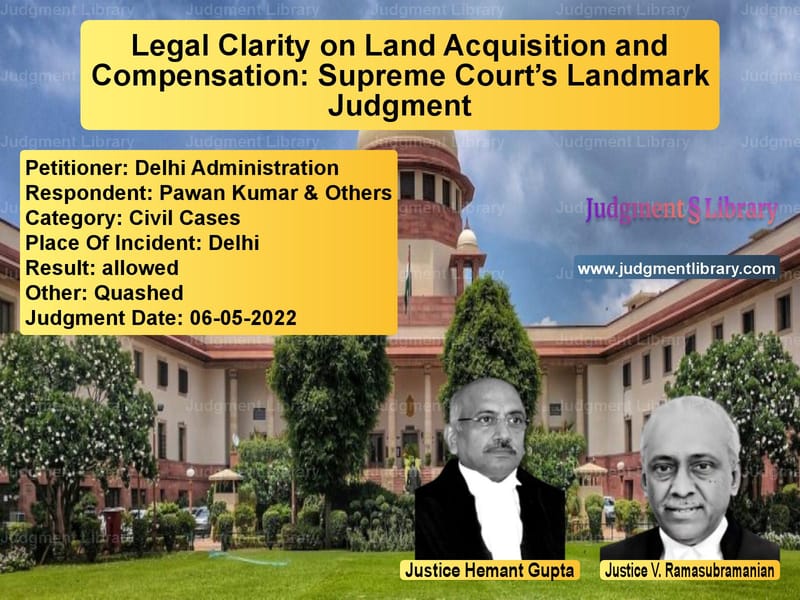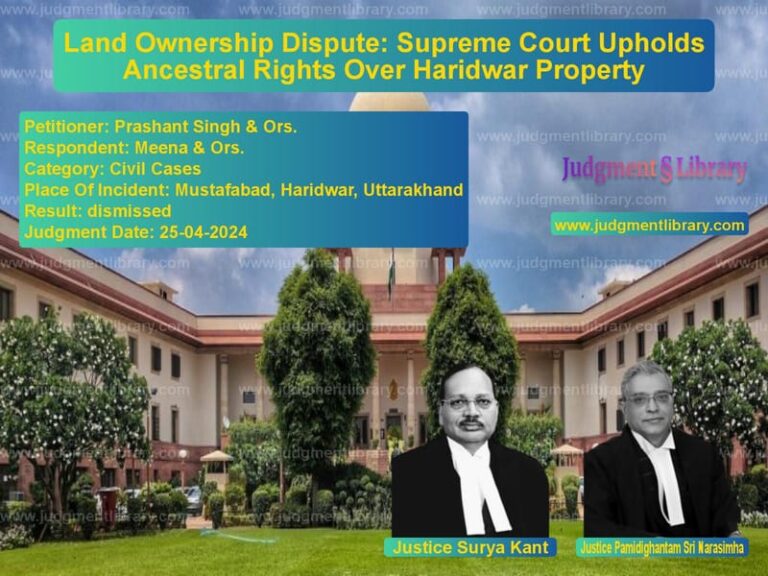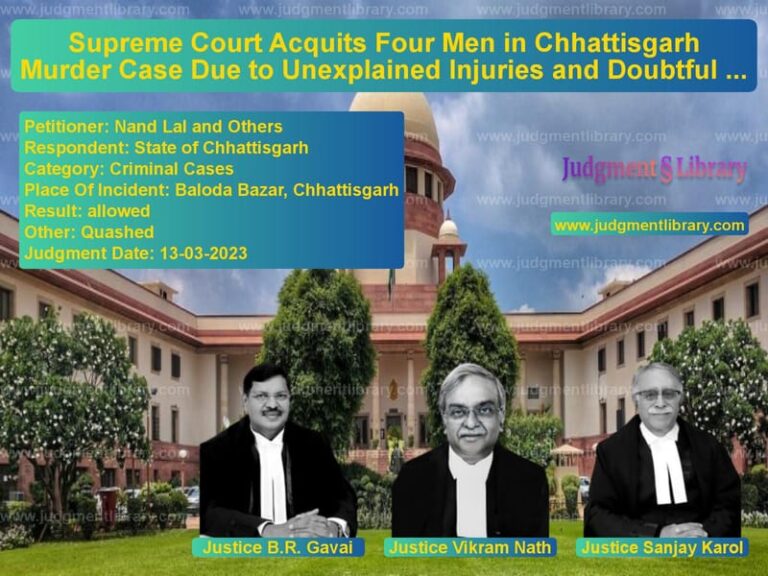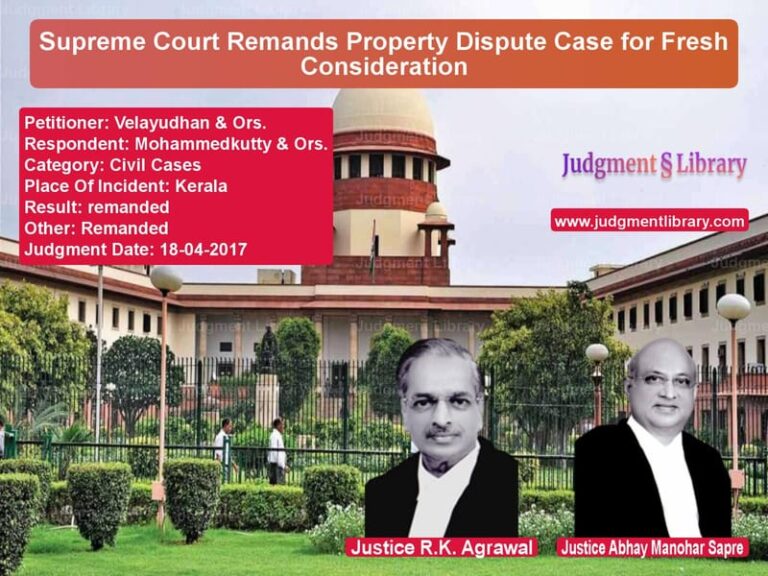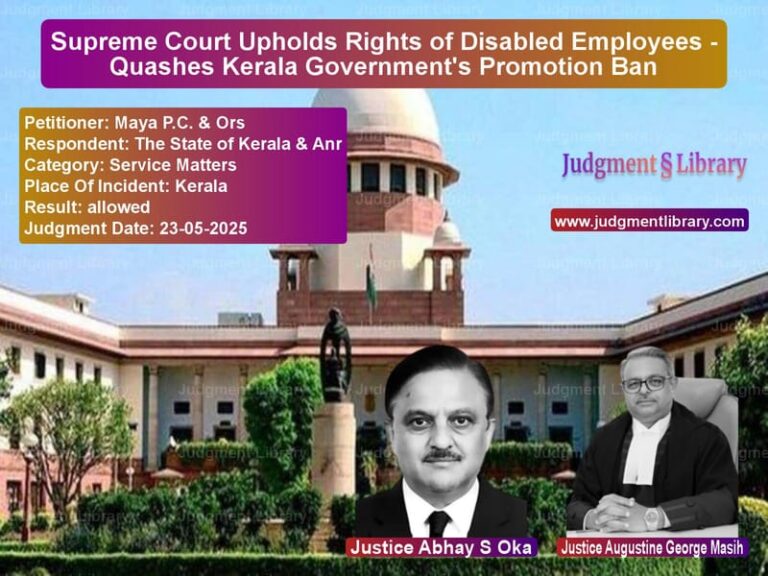Legal Clarity on Land Acquisition and Compensation: Supreme Court’s Landmark Judgment
In a significant ruling, the Supreme Court of India in Delhi Administration v. Pawan Kumar & Others clarified the conditions under which land acquisition proceedings may be deemed to have lapsed under Section 24(2) of the Right to Fair Compensation and Transparency in Land Acquisition, Rehabilitation and Resettlement Act, 2013 (the ‘2013 Act’). This case addressed key legal issues surrounding compensation payment and the rights of subsequent purchasers in challenging acquisition.
The case primarily revolved around whether a land purchaser, who bought land after the acquisition process had been completed, had the legal right to claim the benefit of the 2013 Act’s provisions on lapsing of proceedings. The Court analyzed the interpretations of possession, compensation, and legal standing of subsequent purchasers in cases of land acquisition.
Background of the Case
The dispute originated from the acquisition of land in Sayoorpur village, Tehsil Mehrauli, New Delhi, where the Delhi Administration issued notifications under the Land Acquisition Act, 1894 (the ‘1894 Act’).
Read also: https://judgmentlibrary.com/land-acquisition-and-lapsing-of-proceedings-supreme-courts-verdict/
The sequence of events is as follows:
- 1980: Notification under Section 4 of the 1894 Act was issued for acquiring land.
- 1985: Declaration under Section 6 of the 1894 Act was published.
- 1987: The Land Acquisition Collector announced an award to determine compensation.
- 1985-2006: The original landowner challenged the acquisition proceedings in multiple legal forums but failed.
- 2011: The land was purchased by Pawan Kumar, the respondent, who later claimed the acquisition had lapsed under the 2013 Act.
Arguments by the Appellant (Delhi Administration)
The Delhi Administration, represented by the State’s legal counsel, made the following arguments:
- The acquisition had attained finality as the original landowner had already litigated the case and failed.
- The subsequent purchaser (Pawan Kumar) had no legal right to challenge the acquisition since he purchased the land after the completion of acquisition proceedings.
- The compensation amount had been deposited with the Additional District Judge, which, under the ruling in Indore Development Authority v. Manoharlal, was considered valid payment.
- Possession had been taken as per official records, and mere non-utilization of land did not indicate that possession had not been taken.
- The Delhi High Court’s reliance on the ruling in Pune Municipal Corporation, which held that compensation must be offered directly to landowners and not merely deposited in court, was incorrect.
Arguments by the Respondents (Landowner and Purchaser)
Pawan Kumar and the other respondents presented the following arguments:
- The compensation had not been paid directly to the landowners, which was a necessary condition under Section 24(2) of the 2013 Act.
- Since possession had not been taken physically, the acquisition should be deemed to have lapsed.
- The High Court correctly ruled in their favor by following the principles laid down in Pune Municipal Corporation, which emphasized that mere deposit of compensation in court does not satisfy legal requirements.
- They also argued that the government had not made sincere efforts to take possession, which rendered the acquisition process incomplete.
Supreme Court’s Observations
The Bench, comprising Justice Hemant Gupta and Justice V. Ramasubramanian, scrutinized the claims made by both parties and examined past judicial precedents. The Court noted the following:
- The 2013 Act’s Section 24(2) requires two conditions for an acquisition to lapse: non-payment of compensation and non-possession. However, if either of these conditions is satisfied, the acquisition remains valid.
- The compensation amount was deposited with the court before the cut-off date, and as per the ruling in Indore Development Authority, this was legally sufficient.
- Physical possession does not require continuous occupation; once the land is recorded as acquired and possession is documented, the acquisition is complete.
- The subsequent purchaser had no right to challenge the acquisition when the original landowner had already exhausted legal remedies.
- The Delhi High Court’s ruling in favor of lapsing was incorrect as it misapplied the interpretation of compensation payment.
Key Judicial Precedents Referred
The Court extensively referred to several landmark cases, including:
- Indore Development Authority v. Manoharlal (2020): Clarified the conditions for lapsing of acquisition under the 2013 Act.
- Delhi Development Authority v. Godfrey Phillips (2022): Reaffirmed that land purchasers cannot claim lapsing of acquisition.
- Pune Municipal Corporation Case: Interpreted the meaning of compensation payment and lapsing of acquisition.
- Shyam Nandan Prasad v. State of Bihar (1993): Held that only original landowners could challenge acquisition proceedings.
- Delhi Administration v. Gurdip Singh Uban (1999, 2000): Explained how acquisition proceedings cannot be reopened after finality.
Final Judgment
The Supreme Court ruled in favor of the Delhi Administration and overturned the High Court’s decision. The key points in the judgment were:
- The acquisition proceedings had not lapsed under Section 24(2) of the 2013 Act.
- The subsequent purchaser had no legal standing to challenge the acquisition.
- Compensation deposited in court was a legally valid form of payment.
- Possession had been taken in accordance with legal provisions.
- The High Court’s interpretation of Pune Municipal Corporation was incorrect.
Implications of the Judgment
This ruling has significant implications for land acquisition cases, particularly:
- Reaffirming that land purchasers cannot claim benefits under the 2013 Act if the original landowners had settled their claims.
- Establishing that once possession is taken and compensation is deposited, acquisition proceedings do not lapse.
- Preventing misuse of Section 24(2) of the 2013 Act to challenge long-settled acquisitions.
- Strengthening the legal standing of state authorities in defending land acquisitions.
- Providing clarity on the interpretation of compensation payment under land acquisition laws.
The judgment sets a clear precedent for future cases involving land acquisition disputes, ensuring that judicial interventions do not unfairly overturn finalized acquisitions. It upholds the legal principle that once land acquisition reaches a conclusive stage, it cannot be repeatedly challenged by subsequent purchasers.
Petitioner Name: Delhi Administration.Respondent Name: Pawan Kumar & Others.Judgment By: Justice Hemant Gupta, Justice V. Ramasubramanian.Place Of Incident: Delhi.Judgment Date: 06-05-2022.
Don’t miss out on the full details! Download the complete judgment in PDF format below and gain valuable insights instantly!
Download Judgment: delhi-administration-vs-pawan-kumar-&-others-supreme-court-of-india-judgment-dated-06-05-2022.pdf
Directly Download Judgment: Directly download this Judgment
See all petitions in Property Disputes
See all petitions in Landlord-Tenant Disputes
See all petitions in Damages and Compensation
See all petitions in Public Interest Litigation
See all petitions in Other Cases
See all petitions in Judgment by Hemant Gupta
See all petitions in Judgment by V. Ramasubramanian
See all petitions in allowed
See all petitions in Quashed
See all petitions in supreme court of India judgments May 2022
See all petitions in 2022 judgments
See all posts in Civil Cases Category
See all allowed petitions in Civil Cases Category
See all Dismissed petitions in Civil Cases Category
See all partially allowed petitions in Civil Cases Category

